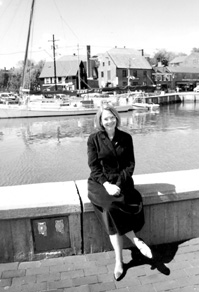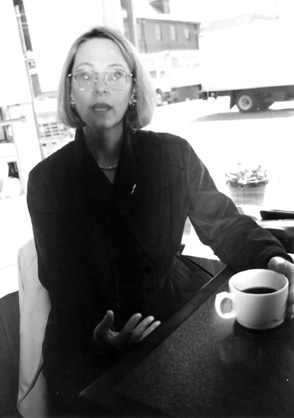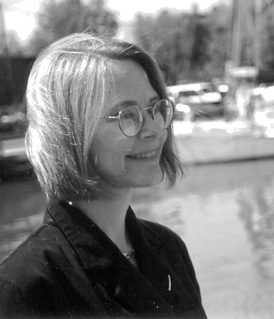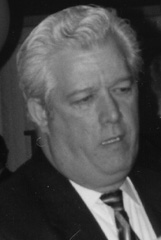
A.A. County Councilwoman Diane Evans
with Bill Lambrecht
NBT Interview: 
A.A. County Councilwoman Diane Evans
with Bill Lambrecht
Little Evans Tries to Topple Big John
First she declares her campaign to oust County Executive John Gary. Then she switches to the Democratic Party. Win or lose, no Anne Arundel politician has made more waves in 1998 than Diane Evans.
No, Diane Evans is not Ms. Perfect: She showed up seven minutes late for an interview about her campaign for Anne Arundel county executive. But her perfectionist - some would say persnickety - ways as an Anne Arundel County Council member and as chair of that governing body have rankled politicians of both parties, none more so than County Executive John Gary.
After feuding with fellow Republican Gary, Evans cast caution to the wind in January and declared that she would challenge Gary and his "arrogance of power" in the Republican Party primary. That was the first of her stunning political moves.
Three months later, she bid adios to the Republican Party that she joined in the Watergate era and announced that she has become a Democrat. Her switch broadens her potential base of support and gives her more time before her November showdown with Gary - provided she wins an unanticipated Democratic primary contest.
But will she have time enough to make the case against Gary?
Can she slice through the malaise of voters, whose anger has ebbed in recent years? Have Gary's bluster and bullying methods alienated voters? Does Evans have the political skill it may take to compensate for Gary's mammoth spending advantage? One ally, watching Evans at a recent gathering, observed that she comes off more like a senior staff member than as a hungry politician.
Evans, 49, lives in Arnold with her husband, Jeff, an administrator for child, health and human development programs at the National Institutes of Health. She talked about her life, her vision for Anne Arundel County and her uphill campaign over coffee at City Dock Cafe in Annapolis.
Q Does the world look any different now that you crawl out of bed mornings as a Democrat?
A No, because I'm no different. I have the same philosophy and a track record to back it up, and I don't see that changing.
Q I recall Bob Dole resigning from the Senate two years ago in an effort to bring attention to his campaign. Was switching parties a tactical effort to reinvigorate your campaign?
A It was done for logistical and philosophical reasons in the sense that what I discovered since I started campaigning for county executive was that the message I was taking to people was resonating with Democrats. Anne Arundel County Democrats by and large are very conservative folks. And because of that, there's always a lot of crossover voting. Democrats vote Republican and Republicans vote Democratic. They vote for the person that best represents their philosophy. By and large, most people are looking for someone who is going to make a personal connection with them, who's going to do what they say and deliver on those promises.
Q Has the positive reaction and support you've received from Democrats outweighed the negative feelings that came your way from Republicans?
A I have received a tremendous amount of support from Democrats, but I've also received a lot of very positive feedback from Republicans as well. I have spent half of my life in one party and I have been proud of my association with it and the ideals and principles I've stood for. I have no intention of ignoring that and pretending that it never happened. It was a big part of my life. But keep in mind that to me, nothing has changed. I'm still the same person I was, with the same beliefs and philosophies.
Q Have your Republican friends expressed disappointment?
A Yes. The reaction has ranged from stony silence to 'I don't like what you did and I will never vote for you again.'"
Q Is that easy for you to accept? Or does it just roll off your back like water off a duck?
A I expected it.
Q Do you think about it? Does it concern you that you disappointed old allies?
A What I realized is that decisions that are made don't always please people. I accepted their reaction. I understand it.
Q Let's talk about your life before Maryland. You're from Massachusetts and then you ended up in North Carolina. Did your family move there?
A My father found a job in Greensboro.
Q If I recall, your father worked in the textile industry, which had started in a decline in New England. Is that right?
A I was too young to realize what was going on. My grandfather had been involved with the textile industry. My father had worked there. He had four children to support and a wife, so he found another job and he ended up in Greensboro. So I went to high school in Greensboro
Q How did you end up at Illinois College in Jacksonville in central Illinois?
A Some of my relatives on my father's side are from Jacksonville. I went to the campus and loved it. I applied and was accepted. When I was in college, I worked for the Jacksonville School for the Blind for a year. Then I worked at Jacksonville State Hospital [a mental health facility] as a caseworker a year after I graduated.
Q Do you think that your jobs helping people in difficult straits shape your worldview?
A Let me explain it this way, and I'm reminiscing a bit. When I took the job as a caseworker, people didn't think I was suited for it, that I wouldn't like it and I wouldn't work out. Well, I loved it. I did social histories on the clients, worked with them in support groups. It certainly exposed me to folks who have a number of problems, from those who are psychologically impaired to people who are physically disabled, blind, deaf, missing a limb, victims of abuse, alcoholics, the whole gamut. I worked on both male and female wards. I was happy working there. I didn't take it home with me any more than I did when I worked with domestic relations with Anne Arundel County for 10 years. Or when I worked at Crownsville state hospital with a private foundation for about a year.
Q When you were in Illinois, the Equal Rights Amendment wars were underway in nearby Springfield. Did you ever get involved?
A No, but I did march for equal rights in Washington. I also went to the big women's conference in Houston. I was an alternate delegate in 1977.
Q It was a tough time for the Republican Party when you joined in the '70s, the Watergate years. What were you thinking? Might you have been looking at Republican scandals in that era as momentary blips on the radar screen?
A I was too young at that point. I was not sophisticated politically, I really wasn't. It was a way I could get to know people and find out what was going on and then branch out and get involved with more community activities, which is what I did here [in Maryland] after we got married. I worked in local campaigns and got involved with the League of Women Voters. I wanted to start being a part of the community rather than just living here. And I found out I really liked it.
Q Watching politics for many years, I've often thought that people are drawn to political parties for social reasons rather than philosophical reasons. Is that the case with your joining the Republican Party in the 1970s?
A That's probably fair to say. My parents were Republican. We come from a very conservative background. My parents were Republicans in Massachusetts, a very Democratic state. I was never involved in politics per se, other than being class president. I never thought I would be remotely interested in this type of politics. It just never dawned on me. It was kind of an evolutionary thing.
Q When you were a bit younger, you backpacked in Europe for two and a half months. Are you an outdoors sort? Do you still travel to Europe?
A Last summer, my husband and I took a week hiking tour of Cornwall in England. It was the best vacation we've ever had. We hiked about 65 miles, saw the most incredible scenery. I've been able to travel a good bit. I just loved Cornwall. It's just my favorite place in the whole world. Different vistas every day. People kind and friendly. Flowers everywhere. Blue sky. I called it God's garden. It was spectacular, quiet and moving in a spiritual way. [Recently], we've been taking day hikes with friends.
Q Let's talk about what George Bush used to call "the vision thing." This New York Times on our table here has a quote from Geraldine Ferraro, who's running for the Senate in New York: "Why I'm running is that I really want to have an impact on what is going on in our country in the next century." Can we take the "r" out of country and talk about what impact Diane Evans wants to have on the county of Anne Arundel
A I've been trying to share this with people on the campaign trail. And it's something that's been important to me, quite frankly, since I've been in public office and even before. People on a local level basically want safe streets, good schools, recreational opportunities. As a community person, as a civic activist and in the last eight years as an elected official, I have tried very hard to make government workable, efficient and cost-effective.
My way of being a council person is to give it a personal touch, to do my best to respond to people personally, solve their problems, or at least give them some direction on how they can solve their problems. I have tried to convey to my constituents that they can call me any time. I want them to connect with government in a positive way, not in a negative way.
I am not in the business of trying to dismantle government. That is not my purpose. What I want to do is make government work better. I want it to be responsive. I believe truly that whether you are Republican, Democratic or independent, we all are looking for the same sort of thing. We want an efficient government that is responsible and that we can depend on. We can't rely on government to do everything, and even though I am now a Democrat, I realize that there is a limit to what government can do.

Q Mr. Gary, as everyone knows, has been in a running battle with school administrators. He seems to suggest that they're taking taxpayers for a ride.
A I don't agree with that. There are certainly ways the school system as well as the county can improve efficiency. I think we have been making positive steps in that direction. [Gary's budget request] did not deal with the maintenance backlog. The budget does not provide an adequate complement of teachers, even in the special education areas. This budget does not appear to provide the kind of services that parents can demand. There is also a problem with the county executive having proposed 'X' number of teachers but providing only half of the health benefits. The teachers also need a cost-of-living raise.
Q You voted against the new auto racing track in northern Anne Arundel
A I recognize that motor sports racing facility could be a wonderful boon. I accept that. I know it's a very popular sport. All ages and income levels love motor sports racing. I would probably enjoy it myself. But what troubled me about that proposal is that it was kicked from one area to another, and again, government needs to be responsible and sensitive to the needs of the citizens. If you've got a good project and it's something that stands on its merits, I think it's better to try to work with communities and explain what it is you want to do; work with them, listen to what they have to say and try to address those concerns before you put legislation down that forces the issue.
Q So you voted no, but you might not always be against it?
A Right. That was for that particular situation. It was not handled well. There are other projects where the developers have spent time working with state and local officials and citizens.
Q In the pension debate a few years ago, Republicans on the council couldn't understand how, now that their party was in power, you didn't go along with them on the reform proposal
A They totally missed the point. They knew that legislation needed some work. And by putting my foot down and making sure that we truly got the best debate on it, I think we got the best bill possible. This county has been through a lot of trauma because of pension legislation in the past. We are paying for it. We have paid for it financially. We have paid for it emotionally. We have paid for it politically because decisions were made too quickly in 1989 and, quite frankly, before that. That's my role as a legislator. Not just to say yes to everything but to say 'okay guys, we've got something we need to look at.'
Q You gave momentum to an effort to study whether the unusual number of cancers in Anne Arundel are connected to the environment. Tell us about that.
A It was an issue brought to me by four or five women in my district, and they are all women whom I have a great deal of respect for and are very involved in the community in a myriad of ways. Their question was why was the cancer mortality rate so high. I thought the best way to address it was to put together an ad hoc committee. I worked with them to make a vehicle by which volunteers of different experiences - demographers, scientists, engineers - could get together and work on this question. They produced a 70-page report and accompanying documentation. They also looked to see where in the county there are cancer hot-spots. I don't know whether there have been results that answered the questions.
Q You a lluded to the good times in Anne Arundel County right now.
John Gary can be expected to take full advantage of the good times. Do you
need to reframe your message to appeal to people in good times?
lluded to the good times in Anne Arundel County right now.
John Gary can be expected to take full advantage of the good times. Do you
need to reframe your message to appeal to people in good times?
A I don't think my message has changed since I first ran for county council. Whether it's good times or not so good times, you still must pay attention to what your vision for the county is. At this point, yes, we have a surplus. I believe that we ought to be attending to income tax relief, which the state is taking care of to a certain extent. But there are things we need to take care of. Rather than starting a lot of brand new projects which in and of themselves are probably delightful to have, I think we ought to be concentrated on school maintenance. We have a tremendous backlog. This should be the opportunity for us to take a chunk of that problem and resolve it. The money is sitting there. We know what needs to be done. So let's do it.
Q Regarding the environment, there was a survey done recently by Anne Arundel County Community College in which the number one concern was growth. Are there some proposals that you think should be considered in the coming months?
A One of the things I think we ought to do is review the adequate facilities ordinance to determine if the standards ought to be changed and whether it is accomplishing the objectives we set out nearly 20 years ago. What I'm going to need to do is put together the best team of people I can and come up with the ideas to address these kinds of issues and make them work. I know people who, given enough time and motivation, can suggest resolutions to problems. I am not going to say that we are going to be able to resolve the fears and frustrations that everybody has about growth and development. The fact of the matter is that growth and development will take place. But where we locate it and how we time it are critical.
Q Our newspaper fields a great many complaints about the Planning and Zoning Office, about developers getting their way but regular people getting harassed for small stuff. Is there anything that should be done to make that office work better?
A It would take people who know that system very well as well as people from the outside. I think it needs several different things. I think there are many new ways that things can be done to preserve our quality of life. People's reaction to development changes. If you plan it well so you have sufficient infrastructure and you also have designed it so that it's appealing and it's going to hold up over time, and you have greenspaces interspersed, people's reaction is going to be very different than if you take an area, mow down all the trees, put up housing.
Q Is there a short list of things that a county executive can do to either improve or slow the degradation of Chesapeake Bay?
A One thing that is needed is enforcement. We do have an enforcement law, but I think we need to beef that up. I know that the county has an answering service and they do the best they can, but I think that when it comes to environmental laws, we need to ensure that 24 hours a day, we don't just have an answering service but we have people to respond to those emergencies.
Q You've used the phrase "arrogance of power" to describe John Gary. Has Gary's attitude, as you see it, transferred from his office to this campaign?
A I don't see much evidence of his campaign.
Q He has seemed to be dismissive all along of your challenge. Rather than engaging you, he dismisses you. Are we interpreting that correctly?
A That's what he has always done. He's dismissed me.
Q You've suggested that because of Gary's contributions from developers, people ought to worry that if he wins re-election in November, it will be payback time. Should voters have that concern?
A They do have that concern. And that is one reason, a very large reason, why it's important that I challenge him That he be challenged. Because without opposition, he will have free rein to do exactly as he pleases.
Q Would he do exactly as he pleases?
A Yes, he would. One of the reasons he is so distressed by me is that when I felt he was wrong or missed the bus or was ill-advised, I have challenged him to look at things differently. He does not like being challenged. He does not like being told that he is off in the wrong direction. But no matter who you are, no matter what your station in life, there are going to be times when you need good advice from people and you need to think of things differently for the sake of the county. I have on innumerable occasions tried to express to him as a district council person, and as chairman, that he was heading in the wrong direction.
Q Are you saying he was unwilling to take
that advice and weigh it?
A He would be very resistant.
Q When was the last time you spoke with him?
A We say 'hi' to each other, but as far as really talking it's probably been a year and a half ago.
Q Do you think he resents women with forceful opinions?
A Definitely. I have a hard time answering that because I work with all men on the council.
Q Implicit in that phrase "good-old boy" network is men who don't listen to women.
A They also don't listen to the people.
Q So are you saying that Gary's payback to contributors would be more development?
A It's not just that. But if you look at the folks he's surrounded himself with and the people who are his special compatriots, you would find that he does special favors for these people and ignores everybody else. So people are concerned that what will happen is that it will be payback time and that he will have free rein.
Q What is an example of a special favor?
A Just look at what he's done with perks - credit cards and cars. He has been very generous, very liberal, with his granting of credit cards, bonus pay, things of that nature, to his personal staff. But to the rest of the county appointees, he has turned a deaf ear.
Q Has your point been that it sends a bad message when your spouse is on the county payroll, like Gary's?
A Yes it does. He should have moved her to another department, at least, when he became county executive.
Q Right or wrong, there's a perception out there that your campaign has yet to ignite, that you aren't getting enough attention and that you haven't engaged Gary sufficiently to draw the distinctions that need to be clear in the minds of an electorate that isn't paying lot of attention.
A I do have to say, I have been out there consistently since I announced. My schedule is very, very full. I've been giving presentations on county issues and I'm in many political situations; I have been in parades. And I have a full complement of activities ahead. As far as catching fire, this campaign is a grass-roots effort. My observation as a candidate is that people are excited, people are excited about [my campaign].
Q Do you enjoy plunging into crowds and meeting people, wooing voters? When it comes to campaigning, do you have what has been referred to as 'the fire in the belly'?
A I've got it. I couldn't keep doing this every day if I didn't. I like to do this; I've always liked it.
| Back to Archives |
VolumeVI Number 21
May 28 - June 3, 1998
New Bay Times
| Homepage |